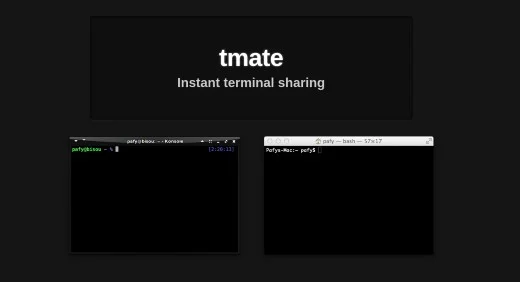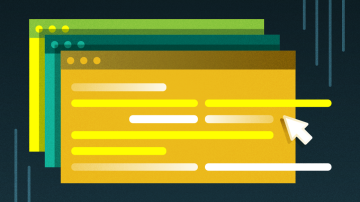Some time ago, I engaged with a Twitter thread that went viral among techies. The challenge? Pick only five tools that you cannot live without. I started to think about this in relation to my everyday life, and picking just five tools was not easy. I use many tools that I consider essential, such as my IRC client to connect with my colleagues and friends (yes, I still use IRC), a good text editor to hack on things, a calendar app to keep organized, and a videoconferencing platform when more direct interaction is needed.
So let me put a twist on this challenge: Pick just five open source tools that boost your productivity. Here's my list; please share yours in the comments.
tmate

Victoria Marinez de la Cruz, CC BY-SA 4.0
Oh, I love this tool. tmate is a fork of the well-known tmux terminal multiplexer that allows you to start a tmux session and share it over SSH. You can use it for pair programming (which is my primary use case) or for remote control.
If you collaborate often with your team members, and you want an easy, distro-agnostic, open source way to program with them (and sharing terminal access is enough for you), this is definitely a must-add to your list.
Get more info on tmate's website, or check out the code on GitHub.
ix
ix is a command-line pastebin. You don't need to install anything; you can create new pastes just by curling to the ix.io site. For example, echo Hello world. | curl -F 'f:1=<-' ix.io will give you a link to ix.io where the message "Hello world" is pasted. This is very convenient when you want to share logs for debugging purposes or to save config files in servers where you don't have a desktop environment.
One downside is that the source code is not yet published, even though it is intended to be free and open source. If you are the author and are reading this post, please post the code so that we can contribute to the polishing process.
asciinema
Yes, this is another terminal tool. asciinema allows you to record your terminal. There are many ways to use it, but I generally use it to make demos for presentations. It's very easy to use, and there are packages available for many Linux distributions and other platforms.
To see how it works, check out this cool demo. Isn't it great?
Get more information on asciinema's website and access its source code on GitHub.
GNOME Pomodoro

Victoria Martinez de la Cruz, CC BY-SA 4.0
OK, that's enough with the terminal tools. Now I want to share this simple gem for getting and staying organized. Have you heard about the Pomodoro Technique? Pomodoro is basically a time-management tool. It uses a tomato-shaped timer that helps you split your time into work chunks and breaks (by default, 25 minutes of work followed by five-minute breaks). And, after every four pomodoros, you take a longer break (15 minutes by default). The idea is that you stay focused during the work time, and you stretch and relax on the breaks.
This sounds very, very simple, and you might be hesitant to allow a tomato-shaped clock to control your life, but it definitely helped me get better organized and avoid exhaustion when trying to focus on many things at the same time.
Whatever your role, I highly recommend this practice. And among the many different tools that implement it, I recommend the GNOME Pomodoro app. It's available for major GNU/Linux distros, so it requires that you use the GNOME desktop environment (this might be its downside).
Check out more information on GNOME Pomodoro's website, and access its GitHub repo to get the source code and learn how you can contribute.
Jitsi
Last but not least is Jitsi. When you're working on a remote, globally distributed team, you need a way to connect with people. Instant messaging is good, but sometimes it's better to have a quick meeting to discuss things face to face (well, seeing each other faces). There are a lot of videoconferencing tools available, but I like Jitsi a lot. Not only because it's free and open source, but also because it provides a clean, functional interface. You can set up your own Jitsi server (for business purposes), but you can also try out a public Jitsi instance by going to the Jitsi Meet website.
A good practice for setting up this kind of meeting: use it only when you have a clear agenda in mind. And always ask yourself, can this meeting be an email instead? Follow these guidelines and use Jitsi with caution, and your workday will be extremely productive!
Learn more on Jitsi's website and start contributing by accessing its GitHub repository.
I hope my list helps you reach the next level in productivity. What are your five, can't-do-without-them, open source productivity tools? Let me know in the comments!










10 Comments